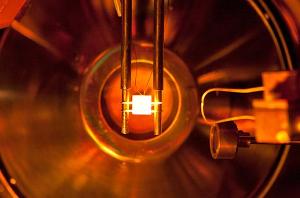Oct 29 2014
For magnetic fusion energy to fuel future power plants, scientists must find ways to control the interactions that take place between the volatile edge of the plasma and the walls that surround it in fusion facilities. Such interactions can profoundly affect conditions at the superhot core of the plasma in ways that include kicking up impurities that cool down the core and halt fusion reactions.
 Lithium-coated molybdenum was heated to a high temperature during a PPPL experiment. Credit: Angela Capece, PPPL
Lithium-coated molybdenum was heated to a high temperature during a PPPL experiment. Credit: Angela Capece, PPPL
Researchers have improved plasma performance by applying lithium coatings to the walls of fusion facilities. But a complete understanding of the mechanism behind this improvement remains elusive. Among the puzzles is how temperature affects the ability of lithium to absorb and retain the deuterium particles that stray from the fuel that creates fusion reactions.
Answers are now emerging from a new surface-science laboratory at the Princeton Plasma Physics Laboratory that can probe lithium coatings that are just three atoms thick. Such probes have examined the surface composition of lithium films on a molybdenum substrate after the films were exposed to deuterium ions. Researchers controlled the surface temperatures, impurity levels and other conditions independently of one another, which could not be done in the complex environment of fusion devices like tokamaks.
The experiments showed that the ability of ultrathin lithium films to retain deuterium drops as the temperature of the molybdenum substrate rises — a result that provides insight into how lithium affects the performance of tokamaks. Experiments further showed that exposing the lithium to oxygen improved deuterium retention at temperatures below about 400 degrees Kelvin. But without exposure to oxygen, the researchers found, lithium films could retain deuterium at higher temperatures as a result of lithium-deuterium bonding.
Armed with these findings, scientists will be better able to determine how to use lithium to enhance the performance of fusion plasmas.